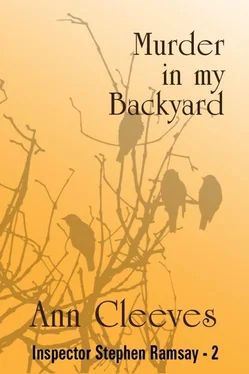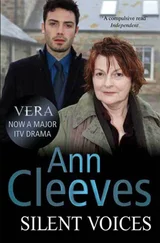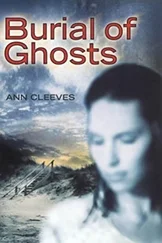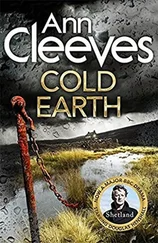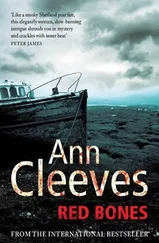Ann Cleeves - Murder in My Backyard
Здесь есть возможность читать онлайн «Ann Cleeves - Murder in My Backyard» весь текст электронной книги совершенно бесплатно (целиком полную версию без сокращений). В некоторых случаях можно слушать аудио, скачать через торрент в формате fb2 и присутствует краткое содержание. Жанр: Детектив, на английском языке. Описание произведения, (предисловие) а так же отзывы посетителей доступны на портале библиотеки ЛибКат.
- Название:Murder in My Backyard
- Автор:
- Жанр:
- Год:неизвестен
- ISBN:нет данных
- Рейтинг книги:5 / 5. Голосов: 1
-
Избранное:Добавить в избранное
- Отзывы:
-
Ваша оценка:
- 100
- 1
- 2
- 3
- 4
- 5
Murder in My Backyard: краткое содержание, описание и аннотация
Предлагаем к чтению аннотацию, описание, краткое содержание или предисловие (зависит от того, что написал сам автор книги «Murder in My Backyard»). Если вы не нашли необходимую информацию о книге — напишите в комментариях, мы постараемся отыскать её.
Murder in My Backyard — читать онлайн бесплатно полную книгу (весь текст) целиком
Ниже представлен текст книги, разбитый по страницам. Система сохранения места последней прочитанной страницы, позволяет с удобством читать онлайн бесплатно книгу «Murder in My Backyard», без необходимости каждый раз заново искать на чём Вы остановились. Поставьте закладку, и сможете в любой момент перейти на страницу, на которой закончили чтение.
Интервал:
Закладка:
She had always been attracted to danger and extremes. When other girls at school had misbehaved, they had kept open an avenue of retreat, of apology. In arguments with parents they had been prepared to compromise. Mary Raven had been expelled from school, and at sixteen she had left home to live in a squat until the life there had become too uncomfortable and she had returned, still defiant, to her parents. She had never been reasonable.
When it was light, she went to the kitchen and poured out a bowl of cornflakes. There was no milk and she padded, barefoot, through the entrance hall to the front door to fetch it. Outside it was warmer and the sky was clear. She felt restless and optimistic. Perhaps she should drive to the Health Centre, she thought, and wait for Max. It would be a pleasure just to see him, to exchange a few words with him. But she rejected the plan almost immediately. Max might be irritated by the attention and, besides, it would be dangerous. It was to distract her from doing anything foolish that she sat at the table to work. She began to write up the court proceedings of the day before, banging on her secondhand typewriter and waking up the student who had the bed-sit in the next room. Soon she became engrossed. When she paused to dress and make more coffee, she thought that while Max was making up his mind she still had her career to consider.
Mary Raven was not in the Express office when Ramsay and Hunter arrived. James Laidlaw was there, hostile and intimidating, still talking about the police mismanagement of the case and their incompetence in allowing Charlie Elliot to run away.
“I understand that he was interviewed twice,” James said, “ and still you let him go. I’ll be making the point very clearly in this week’s paper.”
He could not tell them where to find Mary Raven, and it was Marjory, the receptionist, who suggested that they try the small café on Front Street.
“She came in very early,” Marjory said, “before I arrived. She’s rather a melodramatic young lady. She left me a note saying she was working on a story and she didn’t know when she’d be back. But if she’s in Otterbridge at this time, she usually has a coffee and a sandwich across the road.” She returned to her typing.
The café was empty except for Mary Raven. It had print tablecloths, silk flowers in bowls, and an elderly lady in a black uniform to serve the customers. In the summer it would be full of day-trippers from Newcastle. Mary was drinking more black coffee, cupping her hands around the patterned china cup. She seemed lost in thought. Ramsay looked at her through the window and decided she might be the mysterious woman who had been in the churchyard. She was small, dark, with long hair. She fitted Charlie Elliot’s description. If they could persuade her to admit that she was there, that night, walking through the gravestones, his superintendent might be inclined to believe the rest of Charlie’s story. As they watched she set down the empty coffee cup and began to write in a shorthand notebook that was on the table in front of her. She wrote quickly and fluently, pausing occasionally as if searching for the right word. When they walked into the café, she looked up briefly but took no notice of them. She put them down as reps in town to collect goods from the agricultural suppliers near the market. She imagined them delivering dog food all around the region.
“Miss Raven?”
It was Hunter who approached her while Ramsay went to the counter to pay for tea.
“Yes,” she said. “I’m Mary Raven. Who are you?”
“My name’s Hunter,” he said. “ Gordon Hunter. I’m a policeman.”
“What do you want?” They stared at each other with evident hostility. Ramsay thought they might have been brother and sister: too alike, always fighting. They were both dark, aggressive, unruly. She was still holding the pen and seemed anxious to continue writing. As Ramsay approached with the tea she turned the notebook facedown so that they could not see what had been written.
“Just a few questions,” Hunter said, “about Mrs. Parry.”
“But I thought you were looking for someone in connection with that.”
“We are,” Hunter said angrily, “but there are always a few loose ends. You know how it is.”
“No,” she said, “ I’m not sure that I do. But if you’re going to disturb me anyway you can buy me another coffee.” She waited while Ramsay bought coffee from the counter. “ Who are you?” she asked. “ His sidekick?”
“Something like that,” Ramsay murmured. He sat back in his chair, out of her line of vision, and watched her, while Hunter asked his questions.
“You met Mrs. Parry on the afternoon of her death?”
“Yes,” she said. She lit a cigarette. Ramsay thought she looked very tense, very tired. His optimism increased.
“Why did you go to Brinkbonnie?”
“You must know that already,” she said. “ To cover the residents’ meeting about the proposed new development.”
“But Mr. Laidlaw had made it clear that he did not want to follow the story any further.”
“Yes,” she said. “Well. Perhaps James has too many scruples.” She spoke with a bitterness that surprised Ramsay. “Perhaps he could never had made it in Fleet Street, after all.”
“What do you mean?”
“He once had an offer of a job in London on a daily,” she said, “but he turned it down. He claimed it was because his wife wouldn’t want to move, but I’m not so sure. I don’t think he could have handled it. He’s been a big fish in a little pond for too long.” I must be tired, she thought, I’m just being bitchy.
“But you could handle it?” Hunter asked.
“Yes,” she said. “ Why not? I need a break. I don’t want to stay on the Otterbridge Express for the rest of my career.”
“And that’s why you went to Brinkbonnie?”
“Partly,” she said. “I do stuff sometimes for one of the Newcastle papers. Henshaw’s got planning applications outstanding all over the county. I thought it might make a feature. And no-one had done an interview with Mrs. Parry.”
“And she agreed to speak to you?”
“Yes. She was really nice.”
“What did you talk about?”
“The development at first. The meeting had upset her. She wasn’t the sort of rich outsider who moves into a village and takes no part in its affairs. She’d lived there for twenty years. Her husband died there. She thought they were all her friends, then they turned against her. That hurt her.”
“What else did she talk about?”
“All sorts of things. Her family. She showed me photographs of her great-niece and nephews. Then I talked to her about my problems. She was dead easy to talk to.”
“Oh.” Hunter was all charm and flattery. “What problems could you possibly have?”
“I don’t think,” she said, “ that’s anything to do with you.”
He shrugged and smiled. “She didn’t say anything that you feel might have a bearing on her murder?”
“No,” she said. “Nothing at all.”
She looked at her notebook and Ramsay thought she wanted to be at work again.
“Do you know Max Laidlaw?” Hunter asked.
“Yes,” she said. “He’s a doctor at the Health Centre. I know his wife. We’re both involved with the women writers workshop.”
“Did you talk to Mrs. Parry about Max or Judy Laidlaw?”
“Only indirectly,” she said. “ She thought her family should have given her more support over the development issue.”
“She wanted them behind the banners trying to stop the builder?” Hunter was sneering, trying to provoke a reaction.
“Something like that.”
“Not very likely, is it?”
“I don’t know,” she said. “Probably not. James wants to keep his objectivity. Max might be more sympathetic.”
Читать дальшеИнтервал:
Закладка:
Похожие книги на «Murder in My Backyard»
Представляем Вашему вниманию похожие книги на «Murder in My Backyard» списком для выбора. Мы отобрали схожую по названию и смыслу литературу в надежде предоставить читателям больше вариантов отыскать новые, интересные, ещё непрочитанные произведения.
Обсуждение, отзывы о книге «Murder in My Backyard» и просто собственные мнения читателей. Оставьте ваши комментарии, напишите, что Вы думаете о произведении, его смысле или главных героях. Укажите что конкретно понравилось, а что нет, и почему Вы так считаете.
